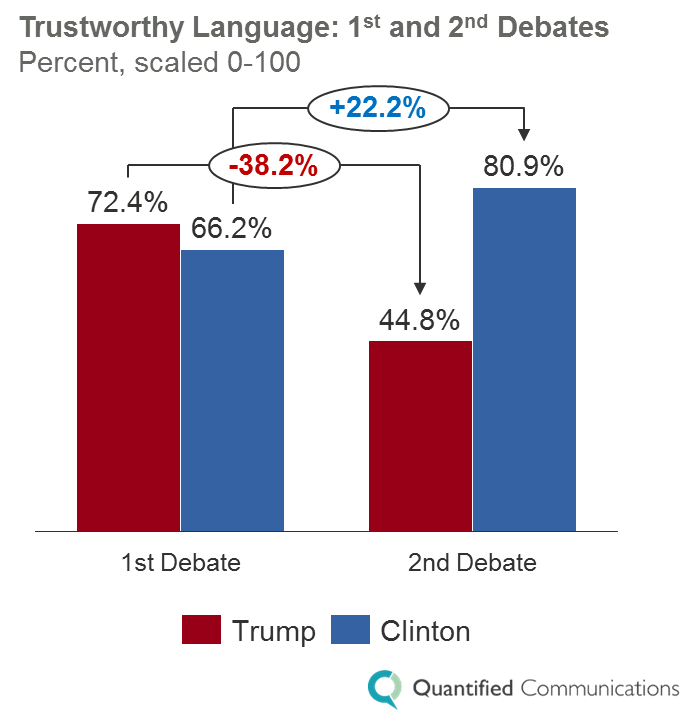Clinton Wins 2nd Debate; Negative Trump Fails to Build Trust

In the wake of the increasingly personal insults and accusations Clinton and Trump have been hurling at one another, and a particularly scandalous week for the GOP candidate, last night’s debate promised to be even more dramatic than the last. In their first moments on stage, the candidates set the tone definitively for what would come, nodding icy hellos rather than shaking hands. And, sure enough, Clinton and Trump both spent the next 90 minutes mounting one attack after another.

In the verbal cage match that was the second presidential debate, did either candidate emerge the winner? The media’s initial reactions were divided, with the LA Times, CNN, and the Washington Post declaring Clinton the victor, while pundits on Fox and Politico praised Trump’s performance.
At Quantified Communications, we’ve been using our proprietary language analytics platform to track Clinton’s and Trump’s language throughout the campaign, and we were tuned in with the pollsters and pundits. We were eager to see, based on our data, who would come out on top in the St. Louis town hall.
Trump Sets Personal Negativity Record; Clinton’s Outlook Improves
One reporter called it the “ugliest debate in American history,” and much of the night did feel more like a Jerry Springer taping than a political event as the candidates attacked each other relentlessly. However, our analytics show Trump was responsible for most of the pessimism expressed throughout the evening.
 He used 34.9 percent more negative language than his opponent as he took several grandiose shots at Clinton:
He used 34.9 percent more negative language than his opponent as he took several grandiose shots at Clinton:
It’s a horrible thing she’s doing. She’s got bad judgment, and honestly, so bad that she should never be president of the United States. That I can tell you.
And at the general state of the United States:
How stupid is our country?
In fact, Trump’s negativity has been on the rise since he clinched the nomination. During the town hall, Trump used 5.9 percent more negative language than he did during the first debate, and 23.3 percent more than he used, on average, in the Republican primary debates. Meanwhile, Clinton’s mood has improved as the race has progressed; she used 6.4 percent less negative language last night than in the first debate, and 10.6 percent less than she used throughout the primary debates.

Clinton’s focus, of late, has been on the good she sees in the country and the positive changes she hopes to make in office.
I think it is very important for us to make clear to our children that our country really is great because we’re good. And we are going to respect one another, lift each other up. We are going to be looking for ways to celebrate our diversity, and we are going to try to reach out to every boy and girl, as well as every adult, to bring them in to working on behalf of our country. I have a very positive and optimistic view about what we can do together.
Clinton Uses 81% More Trustworthy Language than Trump

As many of the town hall’s voter-submitted questions demonstrated, the crux of these debates is whether or not citizens can trust these candidates with the power and responsibility that comes with the Oval Office. So if earning trust was a key goal in last night’s debate, Trump fell short. One of the most notable data points in our analysis of last night’s debate was a significant decline in Trump’s use of trustworthy language — and an increase in Clinton’s.

There are several language characteristics that can help speakers gain trust with an audience, including the insight they can provide for the how and why behind stated goals, the directness of their language, and a balanced emotional tone. But, according to executive communication coach Briar Goldberg, one critical trust-building pattern in which Clinton far outperformed her opponent is the willingness to hold herself accountable for her message.
Throughout the debate, Clinton used 12.4 percent more personal pronouns than Trump, taking responsibility for her actions and her plans.
Both candidates were asked last night to comment on scandals that have threatened to destroy their campaigns. For Trump, it was the video released last week in which he bragged about sexually assaulting women. For Clinton it was the use of a private email server. The language they used to discuss those two issues is telling:
Trump: “That was locker room talk. I’m not proud of it. I am a person who has great respect for people, for my family, for the people of this country. And certainly, I’m not proud of it. But that was something that happened.”
Clinton: “That was a mistake, and I take responsibility for using a personal e-mail account. Obviously, if I were to do it over again, I would not. I’m not making any excuses. It was a mistake. And I am very sorry about that.”
“It’s just words,” said Trump as he defended his statements about women in the video. But words make all the difference. Research shows that truthful speakers take ownership, while dishonest ones distance themselves from their messages, as in the classic political example, “Mistakes were made.” Trump’s dissociation from the event in question is just one example of the way his reluctance to demonstrate accountability may decrease his chances of building trust among voters.
This highly combative race is far from over, and we can only expect next week’s debate to be even more vicious than the ones before it. Will Clinton take a third victory, or will Trump finally best his opponent? You can be sure we’ll be tracking.
To find out how QC can use our communication analytics platform to help your leadership deliver best-in-class messaging, email us at info@quantifiedcommunications.com.
This analysis has been reposted at The Science of People.